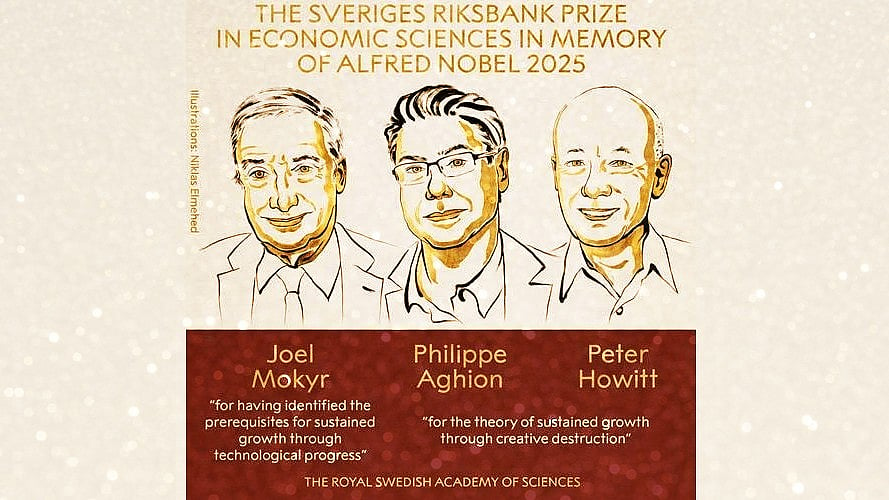World
Joel Mokyr, Philippe Aghion, Peter Howitt win 2025 Economics Nobel
Two Americans, one Frenchman honoured for pioneering research on innovation-driven economic growth and role of creative destruction

Today, 13 October, the Royal Swedish Academy of Sciences announced that Joel Mokyr, Philippe Aghion, and Peter Howitt are the recipients of the prestigious 2025 Nobel Prize in Economics, formally known as the Sveriges Riksbank Prize in Economic Sciences. Mokyr and Howitt are American citizens while Aghion is French.
The award recognises their groundbreaking contributions to understanding the forces driving innovation and economic growth, fundamentally deepening knowledge on how technological progress propels societies forward.
The prize is the final Nobel accolade announced each year and carries a monetary award of 11 million Swedish kronor, approximately equivalent to $1.2 million.
This year’s unique decision split the award between the trio, with one half awarded to Mokyr for identifying the prerequisites for sustained growth through technological progress and the other half jointly to Aghion and Howitt for developing the influential theory of sustained growth through creative destruction.
Mokyr, a professor at Northwestern University in the United States, is celebrated for his historical perspective on innovation, having charted the conditions necessary for societies to maintain long-term economic growth driven by technological advancement. His work emphasises how knowledge accumulation and changing social institutions have enabled sustained progress across centuries.
The second recipient Aghion, affiliated with the Collège de France, INSEAD in Paris, and the London School of Economics and Political Science in the UK, together with Howitt from Brown University, USA, formulated the modern theory of creative destruction.
This concept explains how economic growth arises as new innovations continuously replace outdated technologies and business models, fostering productivity and economic dynamism.
Published: undefined
The Royal Swedish Academy highlighted the transformative insights offered by these economists, stating their work clarifies why economic stagnation is not inevitable and emphasises the need to recognise and counter threats to continued growth.
By explaining the crucial role of innovation and competition, their research provides a robust framework for economic policy aimed at fostering sustainable prosperity.
The Nobel Prize in Economic Sciences, established in 1968 by Sweden’s central bank, has been awarded annually since 1969 to economists whose research has significantly advanced the discipline. Over the years, the prize has recognised luminaries such as Paul Samuelson, Milton Friedman, Amartya Sen, and recent laureates focusing on economic development, financial crises, and behavioural economics.
This year’s award comes in the wake of Nobel announcements in other categories including medicine, physics, chemistry, literature, and peace—the core prizes established by Alfred Nobel’s will in 1895. While the economics prize is technically distinct, it is presented alongside the others at the Nobel Prize Award Ceremonies each December.
With the world facing ongoing economic challenges from rapid technological change, globalisation, and inequality, the laureates’ work arrives at a critical moment. Their pioneering research into how innovation fosters sustained economic growth offers vital guidance for policymakers seeking to stimulate economies while addressing societal needs in an era of transformation.
The 2025 Nobel Prize winners will formally receive their medals and diplomas at a ceremony in Stockholm on 10 December, honouring their exceptional contributions to economic science and human welfare.
With agency inputs
Published: undefined
Follow us on: Facebook, Twitter, Google News, Instagram
Join our official telegram channel (@nationalherald) and stay updated with the latest headlines
Published: undefined